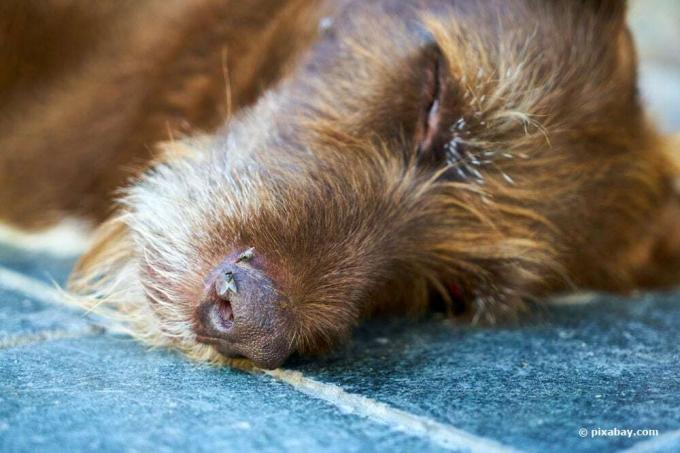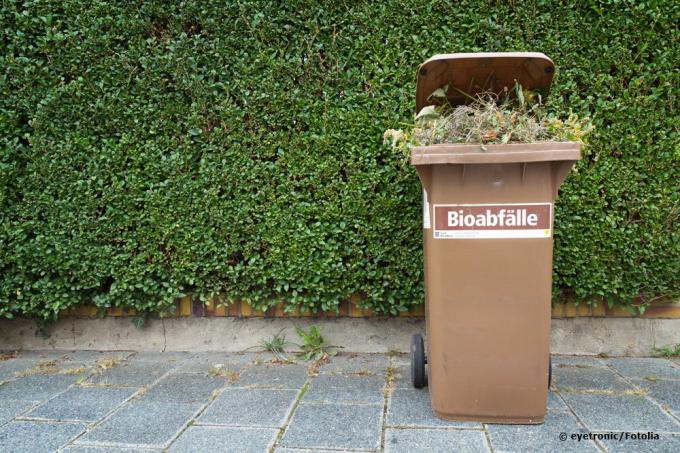
table of contents
- Say goodbye with dignity
- Buried in the garden
- Observe the legal basis
- Legal requirements
- Different designs
- Burial on rental property
- Alternatives to home burial
It's always difficult when your beloved pet goes forever after many years together. There remains mourning, pain and finally the question: what should happen to him now?
In a nutshell
- Legally bury pets in the garden
- Legislator lays down the legal basis
- various alternatives to home burial
Say goodbye with dignity
Around 34 million domestic animals of all kinds are kept in Germany. They not only enrich everyday life, they also become real friends, comforters and companions. If at dog, Cat, bird and co. After many wonderful years of living together, the time has come to cross the rainbow bridge, the owner is left with sadness and pain. But one question remains in the room: What should happen to the loyal companion now? According to the Animal By-Product Disposal Act (TierNebG) and the associated implementing provisions, the deceased animal must be disposed of. There it is processed into animal meal, among other things. Not every pet owner wants such an end for his beloved friend, with whom he has lived through thick and thin for many years. He would rather have him near him even after his death.

Buried in the garden
Many pet owners would like to say goodbye to their loved one with dignity and continue to be close to them. Of course, a burial in your own garden comes into consideration. Such a burial is particularly advantageous for children who have lost their playmates and animal friends. This will help them cope with the loss and process the grief whenever they can visit the grave. Some pet owners are sure to ask whether a burial in the garden is really allowed? This question can easily be answered with "yes". It is usually completely legal to bury pets such as dogs, cats, birds, hamsters and the like in your own garden. However, you must then also observe some legal requirements.
Note: However, simply burying it in the compost is not permitted.
Observe the legal basis
As already noted, the law for the “disposal of animal by-products” and its implementation provisions regulate what should happen after the death of an animal. The carcass normally belongs in an animal disposal facility. This serves the general protection of health and the environment. This is to prevent toxic substances from being released into the environment when carcasses decompose. However, this law also stipulates that burial in the garden is possible under certain conditions. So there are for small animals like:
- Hare
- hamster
- bird
- Mouse, rat and
- Guinea pig

no special requirements. However, they should not necessarily find their final resting place near a kitchen garden. It is also advisable to bury them in a small box that will rot quickly. Permits are not required for such small animals. It looks different with larger pets. As a rule, a dog and cat can also be buried legally. The responsible veterinary office and the regulatory office of the municipality or municipality can provide further information. There are various requirements to be complied with. The decisive factor is always:
- the size of the animal
- the weight
- House burial up to 10 kg body weight is unproblematic
For larger animals and a weight of 10 kg or more, a permit from the veterinary office is usually required. You then have to submit an informal pet burial application. Normally this permission is also granted. However, there are various requirements to be complied with. More on that in a moment.
Note: Smaller pets such as hamsters, birds or mice do not belong in the normal household waste or residual waste bin. It is allowed to put them in the organic waste bin. Infringements are considered administrative offenses and are punished with high fines.

Legal requirements
Of course, the first requirement is to have your own garden to bury your pet there. In addition, the legislature has issued further requirements to prevent damage to the environment and health. If these are violated, high fines of 15,000 euros and even more can be imposed. In the case of a burial in the garden property, the following must be observed:
- Distance from the property line and public paths and places at least 1 to 2 meters
- Depth of the grave at least 50 to 100 cm
- Cover with plenty of soil
- thereby preventing excavation by other animals
- best to leave a small mound of earth
- The grave sags after a while
- Use of containers that rot quickly
- ideal sheets, blankets, towels, newspapers, cardboard boxes or special animal coffins
- no use of foil or plastic fibers
Covering the grave with a stone slab or natural stone would be ideal. This is of course at the discretion of the animal owner. If these requirements are met, there are usually no problems with burying pets in their own green oasis. However, such burials are not possible everywhere. You are not allowed to:
- in water and nature reserves
- Deadly poisons can pollute the ground and water
- if the cause of death is a reportable disease such as tuberculosis or toxoplasmosis

An assessment of possible health risks emanating from the animal body is carried out by the veterinarian. If a burial in the garden is not possible, it is advisable to cremate the dead animal. You can then bury or scatter the ashes in an urn. Violations can result in fines of up to 50,000 euros.
Note: Dead pets, generally all animals, must not be buried in public forests, green spaces, fields or fields. There is a risk of severe fines.
Different designs
However, it must be said that the law is sometimes applied differently in the individual federal states. This is regulated in the implementing laws. It is therefore advisable to contact the public order office or the competent veterinary office for more information about the To inform the requirements before an administrative offense is committed and, as a result, to fines comes. In the Hanseatic City of Bremen, for example, there is a general ban on domestic burials. This measure is justified in the existing high groundwater level and the dense population density of the city.
Burial on rental property
Those who can call their house and garden their own can consider themselves lucky. Here you can decide for yourself whether your beloved animal will be buried here or not. It looks different with tenants. You can't just bury your deceased pet in the garden at your whim. Not all landlords agree. This can quickly lead to inconvenience. Therefore, the approval of the landlord or owner must always be obtained in advance. With allotment gardens, too, it should be borne in mind that a burial can cause problems. The board of directors of the allotment garden can decide whether it is possible to bury your animal here. In short, any tenant or lessee would do well to contact the owner of the property or landlord and ask for permission.

Alternatives to home burial
If you don't have the opportunity to bury your animal in your own garden, you can fall back on various alternatives. There are various options for burying your beloved companion in a dignified manner, such as:
- cremation
- Pet cemetery
- Friedwald
Many pet owners bury their darling in special pet cemeteries, including natural cemeteries. Fried forests. A burial costs between 100 and 300 euros, depending on the species and, of course, the equipment of the tomb. As a rule, the burial site can be used for two to four years. Extensions are possible. It is also possible to have the animal cremated in crematoria. This can be done in individual cremation or group cremation. The costs of a single cremation depend on the size and weight of the animal. They amount approximately from 105 to 315 euros. Added to this are the costs of the urn. The ashes can then be buried normally, there are no special requirements. But you can also take them home with you and scatter them. The latter only on their own land or in uninhabited areas.
As a rule, pet burials are legal. However, the requirements for this can vary from state to state. Small animal burials are unproblematic. A permit from the responsible veterinary office is required for larger ones. No house burial is possible in areas within water and nature reserves or if the animal has died of a reportable disease.
It's not that easy here. As a tenant or leaseholder, the respective owner or landlord or landlord is always required to have a pet buried at home. to obtain the other co-owner. They will not always agree to this. Violations can lead to problems. For the pet owner there are alternatives such as pet cemetery, cemetery or cremation. The ashes can also be taken home.
Of course, some measures need to be taken. The grave must have a depth of at least 50 to 100 cm depending on the size of the animal. Furthermore, enough earth has to be filled in so that it cannot be dug up again by other animals. A distance of at least one to two meters must also be kept to the property line and public paths and spaces. In addition, the animal may only be buried in quickly decaying materials such as sheets, towels, cardboard boxes.



